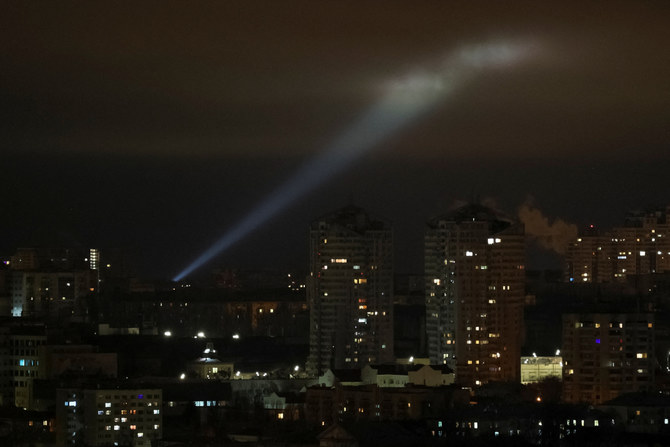WILMINGTON, US: As the war in Ukraine enters its second year, CIA Director William Burns said Sunday that Russian President Vladimir Putin is being “too confident” in his military’s ability to grind Ukraine into submission.
Burns, in a television interview, said the head of Russia’s intelligence services had displayed in their November meeting “a sense of cockiness and hubris” that reflected Putin’s own beliefs “that he can make time work for him, that he believes he can grind down the Ukrainians that he can wear down our European allies, that political fatigue will eventually set in.”

People take a loot at a destroyed Russian T-72B tank, secured from the Ukrainian village of Dmytrivka, outside Kyiv, and placed on display in front of the Russian Embassy in Riga, Latvia, on Feb.26, 2023. (REUTERS/)
That conversation, in which Burns warned of the consequences if Russia were to deploy a nuclear weapon in Ukraine, was “pretty dispiriting,” Burns said.
Burns said he judged Putin as “quite determined” to continue prosecuting the war, despite the casualties, tactical shortcomings and economic and reputational damage to Russia.
“I think Putin is, right now, entirely too confident of his ability ... to wear down Ukraine,” Burns told CBS’ “Face the Nation” in an interview that aired Sunday. Burns said that “at some point, he’s going to have to face up to increasing costs as well, in coffins coming home to some of the poorest parts of Russia,” where he said many of the conscripts “being thrown as cannon fodder” are from.

Central Intelligence Agency Director William Burns. (AP file)
Burns also said Putin was underestimating US resolve to support Ukraine, saying that it has been his experience that the Russian leader’s view is that Americans have “attention deficit disorder and we’ll move on to some other issue eventually.”
The comments came at a critical juncture for the war as the Biden administration is “confident that the Chinese leadership is considering” whether to provide “lethal” military equipment to Russia.
“It would be a very risky and unwise bet,” Burns said, adding that such a move could only further strain relations between the world’s two largest economics. “That’s why I hope very much that they don’t.”
Burns said China’s leader, Xi Jinping, has closely watched how the war has evolved, and “I think, in many ways, he’s been unsettled and sobered by what he’s seen.” The CIA director spoke of “where Putin’s hubris has now gotten Russia,” and said that in authoritarian systems, when “nobody challenges” a leader, “you can make some huge blunders.”
Meanwhile, the question of military aid and the pace of the war is also a source of uncertainty in the US as Republican lawmakers criticized the administration for not sending F-16 fighter jets to Ukraine.
White House national security adviser Jake Sullivan said the US was providing Ukraine with the military aid needed to retake territory seized by Russia. The domestic politics of support for Ukraine are also complicated by some GOP members of Congress who say the administration should pull back and focus more on the needs at home.
Rep. Michael McCaul, chairman of the House Foreign Relations Committee, said planes and long-range artillery could help end the war on a faster timeline. “This whole thing is taking too long,” McCaul said. “And it really didn’t have to happen this way,” said McCaul, R-Texas.
Ukraine won support last month from Baltic nations and Poland in its quest to obtain Western fighter jets, but there have been no signs that nations such as the US and Britain will change their stance of refusing to provide warplanes to Kyiv.
Biden said in an ABC News interview on Friday that he’s “ruling it out for now,” saying that they are not the weaponry that Ukrainians need in the near term.
But Sen. Dan Sullivan, R-Alaska, said the White House has been slow in providing what Ukraine seeks, including jets. “That has been a pattern with this administration from the beginning, where they have slow-rolled critical military weapons systems,” he said.
Jake Sullivan said the US is already providing parts to keep Ukraine’s fleet of Soviet-era jets flying, but supplying F-16s “is really a question for another day, for another phase” of the war.
Jake Sullivan appeared on NBC’s “Meet the Press,” CNN’s “State of the Union” and ABC’s “This Week.” McCaul was on ABC and Dan Sullivan was on NBC.


























